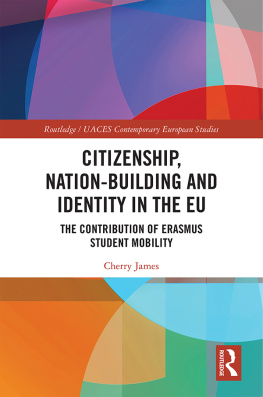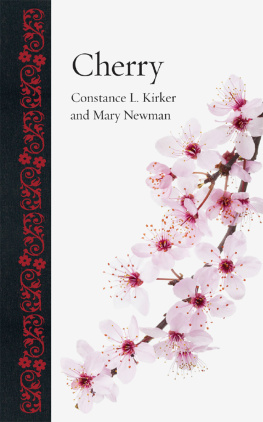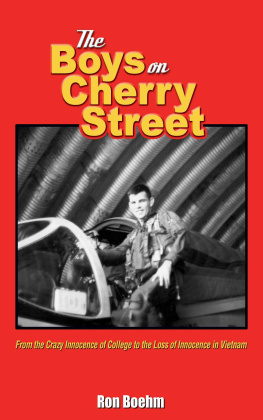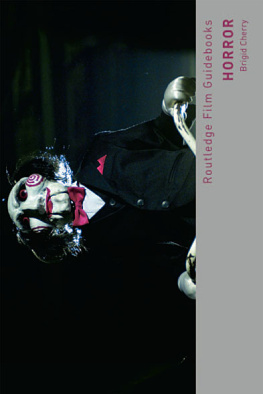The Friendship That Saved Two POWs in Vietnam
A MARINER BOOK
HOUGHTON MIFFLIN COMPANY
Boston New York
First Mariner Books edition 2005
Copyright 2004 by James'S. Hirsch
ALL RIGHTS RESERVED
For information about permission to reproduce selections from
this book, write to Permissions, Houghton Mifflin Company,
215 Park Avenue South, New York, New York 10003.
www.houghtonmifflinbooks.com.
ISBN -13 978-0-618-27348-5
ISBN -10 0-618-27348-4
Library of Congress Cataloging-in-Publication Data
Hirsch, James'S.
Two souls indivisible : the friendship that saved
two POWs in Vietnam / James'S. Hirsch.
p. cm.
ISBN 0-618-27348-4
1. Vietnamese Conflict, 19611975 Prisoners and
prisoners, North Vietnamese. 2. Cherry, Fred V.
3. Halyburton, Porter. 4. Prisoners of warUnited
States. 5. Prisoners of warVietnam. I. Title.
DS 559.4. H 57 2004
959.704'37'092273dc22 2003067595
ISBN 978-0-618-56210-7 (pbk.)
PRINTED IN THE UNITED STATES OF AMERICA
Book design by Robert Overholtzer
23456789 10 QUF
To Amanda and Garrett,
Pearls in the Constellation
CONTENTS
"Better Place, Worse Place"
One More Round
On Target
Hanoi's Welcome
The Independence
"No Chutes Observed"
Strangers in the Cell
No Ordinary Prisoner
The Hanoi March
The Home Front
"Unspeakable Agony of the Soul"
Change in Status
The Good Life
Divergent Paths at Home
Operation Homecoming
Epilogue
SOURCES
ACKNOWLEDGMENTS
INDEX
1. "Better Place, Worse Place"
"Better place, worse place."
Eagle slammed the notebook closed and gave the young American prisoner of war an ultimatum: talk to him and be taken to a camp where he could be with his buddies or refuse to cooperate and be taken to a place where he would suffer. Captured only a few days earlier, U.S. Navy Lieutenant (junior grade) Porter Halyburton didn't know the consequences if he continued to withhold military information. He was already locked inside North Vietnam's notorious Hoa Lo Prison, dubbed "the Hanoi Hilton" by the Americans, a forbidding trapezoidal structure with thick outer walls topped by barbed wire and jagged glass. Years of urine, blood, and vomit permeated the rotting crevices. The food included chicken feet and bread so moldy that it had begun to ferment. Even the prison's name suggested its hellishnessHoa Lo (pronounced "wa-low") means "fiery furnace" in Vietnamese.
Whatever was "worse" would certainly be terrible, Halyburton thought, but still not as abhorrent as assisting the enemy.
At twenty-four, Halyburton was one of the younger American POWs in Vietnam. His six-foot frame, short brown hair, and wholesome good looks fit the prototype of the dashing "fighter jock," whose love of danger and combat had been immortalized in film and literature. But Halyburton was also introspective and artistic, the product of a small college town that had nurtured his intellectual and creative pursuits. He wrote poems, carved wooden statues, and read widely on history and culture. He was also a family man, having married his college sweetheart. The couple's baby daughter was born four weeks before he left for Vietnam.
He was lucky to be alive. On October 17, 1965, his F-4 Phantom jet was shot down forty miles northeast of Hanoi, killing the pilot in a fiery explosion. Halyburton, the "backseat" navigator, ejected without injury Among many combat aviators, it was an article of faith that they would rather die instantly in a crash than be caught by the enemy. Halyburton believed otherwise, but he soon realized that the price of survival would be high.
Immediately after his capture he was sent to Hoa Lo, where his cell, seven feet by six, had a boarded window, a single dim light bulb, and a concrete bed with leg irons. Cockroaches darted through the cells, and rats, some over a foot long, prowled the premises, lending evidence to a postwar POW study that noted, "After sundown, rats and mice literally took over North Vietnam." Scribbled across the faded whitewashed walls were Vietnamese letters, but so too was something more comfortingthe name of an American, Ron Storz. Halyburton wasn't isolated or completely deprived; he could whisper to Americans in adjoining cells and was allowed to shower. Interrogations became a part of daily life: he was questioned by Colonel Nam, a gray-haired Vietnamese commander called Eagle for his authoritarian manner. Using passable English, he offered Halyburton the carrot or the stick. It was his choice.
"Better place, worse place," Eagle intoned repeatedly.
Halyburton only disclosed the information prescribed by the Code of Conduct for captured American servicemen: "Porter Halyburton," he said. "Lieutenant j.g., 617514, 16 January 1941."
Further "quizzes," as they were called, produced the same response, so after two weeks a guard went to Halyburton's cell one night, blindfolded and handcuffed him, and walked him to a truck, which rumbled a couple of miles to the outskirts of Hanoi. He was left at the Cu Loc Prison, believed to be a former French film studio where the grounds were still littered with old film cans, ducks and chickens roamed, and mosquitoes buzzed. A large putrid swimming pool lay thick with water, dirt, garbage, and fish that the Vietnamese guards raised for food. When Halyburton was pushed into his pitch-black cell, he pressed his hands against the walls to discover its dimensions. The room, though relatively largeeach wall was fifteen feet longwas indeed worse than his previous cell. There was no bed, no light, its window was bricked up, and it smelled of wet concrete. But at least Halyburton could still use a tap code to communicate with the POWs in adjacent cells. He was not alone.
The harassment, however, continued. In the quiz room, Halyburton sat on a stool that forced him to look up at his new interrogator, a surly, jug-eared official nicknamed Rabbit, who called the American an "air pirate" and a "war criminal." He made the same threat"better place, worse place"if Halyburton did not reveal the names of his ship, squadron, and plane, but the prisoner didn't give in. The threat was fulfilled: days later, he was moved across the compound to a remote storage room in the back of an auditorium. Once again feeling his way in the darkness, he discovered that this space was only five feet by eight. What's more, it was isolated, preventing any communication with other Americans. That scared him. Except for interrogations, the only time he left the cell was to empty his waste bucket, and there was no more bathing. The questioning had become more abusive; Halyburton was repeatedly harangued ("Bad attitude! Bad attitude!") and slapped across the head.
He sought comfort through prayer. He did not ask for freedom, for food, or for any material comforts. He asked for strength to survive, for companionship, and for the safety of his family. He found inspiration, literally, from above.
One morning he noticed a beam of sunlight filtering through the shutters in his cell and arcing across his cement wall. The next morning he saw the light strike the same place. So he tore a piece of coarse brown toilet paper into the shape of a cross and used rice to stick it on the cement. The following morning the light slowly passed over the crossa radiant signal from God, Halyburton thought. He gratefully whispered the Lord's Prayer.
But the solace didn't last. Halyburton continued to refuse to provide military information and was again taken to a "worse place," this time to a nearby shed. It had two rooms, but he was confined to one that was again five feet by eight. The place had once stored coal and was later designated by the Americans as the "outhouse" or "shithouse." A few holes in the ceiling and space beneath the door supplied scant ventilation, and coal dust covered the floor. Through cracks in the wall, Halyburton could see other Americans walking together in the compound, and he didn't understand why he had been singled out for isolation and mistreatment. Had the other POWs cooperated with the enemy to receive better treatment? In captivity for a month, he had lost twenty-five pounds and had developed dysentery. It was now late November and cold, and his mosquito net provided flimsy refuge from the insects' nightly assaults. The interrogations also continued: Halyburton was questioned about his life as well as the war.
Next page













